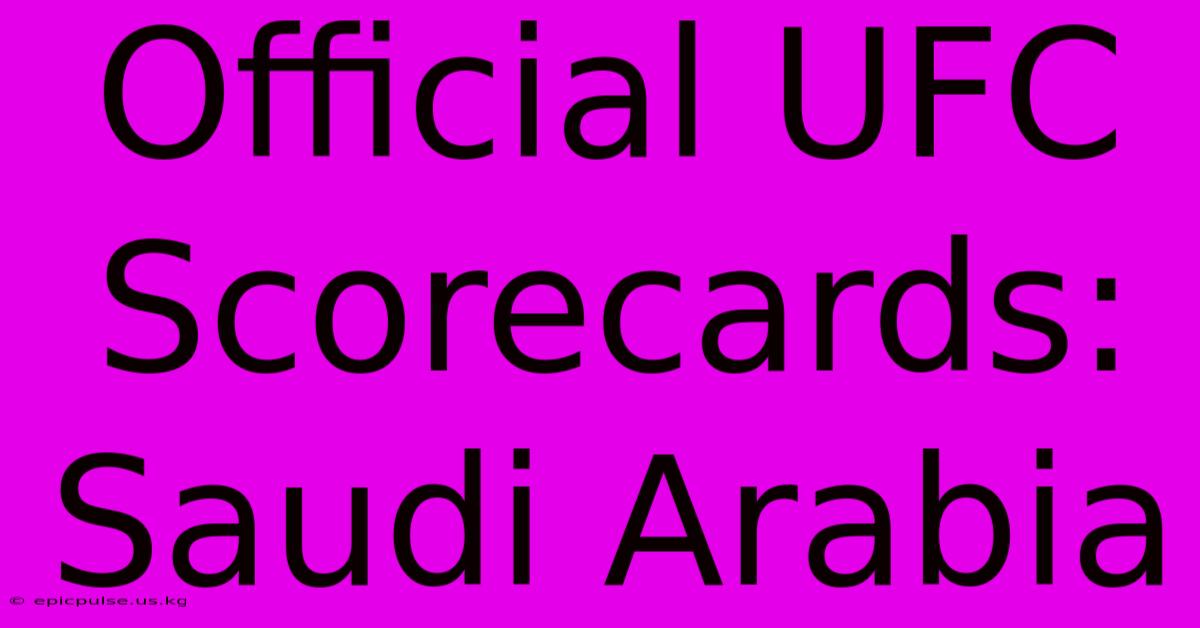Official UFC Scorecards: Saudi Arabia

Discover more detailed and exciting information on our website. Click the link below to start your adventure: Visit Best Website epicpulse.us.kg. Don't miss out!
Table of Contents
Official UFC Scorecards: Saudi Arabia – A Deep Dive into Judging Controversies and Consistency
The roar of the crowd, the clash of titans, the sweat, the blood – these are the hallmarks of a UFC event. But beyond the spectacle lies a crucial element often overlooked: the judges' scorecards. These seemingly simple numerical representations hold immense power, dictating victory and defeat, shaping careers, and occasionally igniting furious debate. This article delves into the world of official UFC scorecards specifically focusing on events held in Saudi Arabia, analyzing potential biases, controversies, and the ongoing quest for consistency in judging.
The Unique Context of Saudi Arabia UFC Events
Saudi Arabia's emergence as a prominent host for UFC events presents a unique context for analyzing scorecards. The nation's burgeoning sports infrastructure and passionate fanbase have made it a key location for the promotion. However, this new landscape also raises questions:
- Cultural Influences: Are there any subtle cultural influences on judging decisions in a country with a different fighting tradition than the West? While judges are ostensibly impartial, the subconscious impact of cultural norms is a factor worth considering.
- Political Considerations: Given the geopolitical significance of Saudi Arabia, are there any (however unlikely) pressures impacting judging decisions? This is a highly sensitive topic and requires careful speculation. However, the integrity of the sport relies on complete objectivity.
- New Judging Personnel: The introduction of new judges to the UFC roster for Saudi events may lead to variations in scoring criteria and interpretation. Consistent training and clear guidelines are essential to mitigate this.
Analyzing Controversial Saudi UFC Scorecards: Case Studies
Analyzing specific events in Saudi Arabia requires careful examination of individual fights, focusing on the following:
- Significant Discrepancies: Identify fights where scorecards showed significant discrepancies between judges, highlighting instances where one judge's scoring deviated sharply from the others. This warrants a closer look at the criteria used.
- Close Fights: Examine "close" fights where the outcome hinged on a single judge's score. These instances reveal the limitations of the current scoring system and its vulnerability to individual interpretation.
- Post-Fight Analysis: Review expert and fan commentary to gauge the general consensus on controversial scoring decisions. This helps establish whether the judges' assessments aligned with the broader viewing public's perception of the fight.
Case Study Example (Hypothetical): Let's imagine a hypothetical UFC fight in Jeddah where one judge scored the fight 48-47 for fighter A, while the other two scored it 49-46 for fighter B. This significant discrepancy would fuel discussions about the judging criteria employed and its application. Did one judge place undue emphasis on takedowns? Did they misinterpret significant strikes? Dissecting these questions is crucial to understanding the scoring process.
The Importance of Consistent Judging Criteria in Saudi Arabia
Consistency in applying judging criteria is paramount, regardless of the event's location. In Saudi Arabia, upholding this consistency presents unique challenges:
- Language Barriers: Ensure clear communication of judging criteria in both English and Arabic, accommodating judges and officials from different linguistic backgrounds.
- Training and Education: Implementing rigorous training programs for all judges working in Saudi Arabia, emphasizing universal standards and criteria.
- Transparency and Accountability: Publicly releasing detailed explanations for judges' scorecards, particularly in close or controversial fights, fostering transparency and accountability.
Off-Page SEO: Building Authority Through External Links and Mentions
Beyond optimizing the content itself, building off-page SEO is vital for enhancing search engine rankings. This involves securing high-quality backlinks from reputable sources:
- MMA News Websites: Reach out to prominent MMA news sites and blogs, offering exclusive insights and analysis of Saudi UFC events and judging controversies.
- UFC Fan Forums: Engage in relevant discussions on UFC fan forums, sharing your perspective and contributing to the ongoing conversation about judging.
- Social Media Engagement: Actively participate in discussions on platforms like Twitter, using relevant hashtags such as #UFCSaudiArabia, #UFCScorecards, and #MMAScoring.
On-Page SEO: Keyword Optimization and Content Structure
To optimize this article for search engines, we've strategically used relevant keywords throughout the text, including:
- Primary Keywords: UFC scorecards, Saudi Arabia UFC, MMA judging controversies
- Secondary Keywords: UFC judges, Saudi Arabia MMA, judging criteria, close fights, controversial decisions, fight analysis
The structure of this article, using headings, subheadings, bullet points, and bold text, also enhances its readability and SEO performance.
Conclusion: The Future of UFC Judging in Saudi Arabia
The continued growth of UFC events in Saudi Arabia requires a steadfast commitment to fair and consistent judging. Addressing the potential challenges discussed above – cultural influences, new judging personnel, and ensuring transparent procedures – is crucial for maintaining the integrity of the sport. By embracing transparency, investing in judge training, and fostering open discussions about scoring controversies, the UFC can ensure that its events in Saudi Arabia uphold the highest standards of fairness and excitement. This commitment will not only enhance the fan experience but also strengthen the sport's credibility and global appeal. The future of UFC judging in Saudi Arabia hinges on its ability to navigate these complexities while preserving the integrity of the sport.

Thank you for visiting our website wich cover about Official UFC Scorecards: Saudi Arabia. We hope the information provided has been useful to you. Feel free to contact us if you have any questions or need further assistance. See you next time and dont miss to bookmark.
Also read the following articles
| Article Title | Date |
|---|---|
| Nottingham Forest Dominates Brighton 7 0 | Feb 02, 2025 |
| Saudi Arabia Ufc Adesanya Knockout Recap | Feb 02, 2025 |
| Imavov Scores Ko Victory Over Adesanya In Ufc | Feb 02, 2025 |
| Nottingham Forest Vs Brighton Tv Channel | Feb 02, 2025 |
| Ufc Saudi Arabia Bonus Winners Announced | Feb 02, 2025 |
